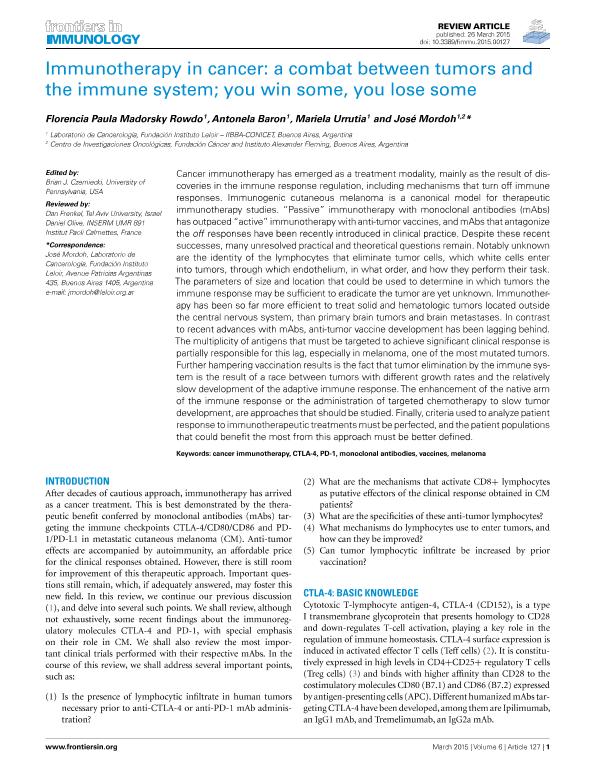Mostrar el registro sencillo del ítem
dc.contributor.author
Madorsky Rowdo, Florencia Paula

dc.contributor.author
Baron, Antonela

dc.contributor.author
Urrutia, Mariela

dc.contributor.author
Mordoh, Jose

dc.date.available
2016-12-20T20:50:51Z
dc.date.issued
2015-03
dc.identifier.citation
Madorsky Rowdo, Florencia Paula; Baron, Antonela; Urrutia, Mariela; Mordoh, Jose; Immunotherapy in Cancer: A Combat between Tumors and the Immune System; You Win Some, You Lose Some; Frontiers Research Foundation; Frontiers in immunology; 6; 127; 3-2015
dc.identifier.issn
1664-3224
dc.identifier.uri
http://hdl.handle.net/11336/9862
dc.description.abstract
Cancer immunotherapy has emerged as a treatment modality, mainly as the result of discoveries in the immune response regulation, including mechanisms that turn off immune responses. Immunogenic cutaneous melanoma is a canonical model for therapeutic immunotherapy studies. "Passive" immunotherapy with monoclonal antibodies (mAbs) has outpaced "active" immunotherapy with anti-tumor vaccines, and mAbs that antagonize the off responses have been recently introduced in clinical practice. Despite these recent successes, many unresolved practical and theoretical questions remain. Notably unknown are the identity of the lymphocytes that eliminate tumor cells, which white cells enter into tumors, through which endothelium, in what order, and how they perform their task. The parameters of size and location that could be used to determine in which tumors the immune response may be sufficient to eradicate the tumor are yet unknown. Immunotherapy has been so far more efficient to treat solid and hematologic tumors located outside the central nervous system, than primary brain tumors and brain metastases. In contrast to recent advances with mAbs, anti-tumor vaccine development has been lagging behind. The multiplicity of antigens that must be targeted to achieve significant clinical response is partially responsible for this lag, especially in melanoma, one of the most mutated tumors. Further hampering vaccination results is the fact that tumor elimination by the immune system is the result of a race between tumors with different growth rates and the relatively slow development of the adaptive immune response. The enhancement of the native arm of the immune response or the administration of targeted chemotherapy to slow tumor development, are approaches that should be studied. Finally, criteria used to analyze patient response to immunotherapeutic treatments must be perfected, and the patient populations that could benefit the most from this approach must be better defined.
dc.format
application/pdf
dc.language.iso
eng
dc.publisher
Frontiers Research Foundation
dc.rights
info:eu-repo/semantics/openAccess
dc.rights.uri
https://creativecommons.org/licenses/by/2.5/ar/
dc.subject
Ctla-4
dc.subject
Pd-1
dc.subject
Cancer Immunotherapy
dc.subject
Melanoma;
dc.subject
Monoclonal Antibodies
dc.subject
Vaccines
dc.subject.classification
Oncología

dc.subject.classification
Medicina Clínica

dc.subject.classification
CIENCIAS MÉDICAS Y DE LA SALUD

dc.title
Immunotherapy in Cancer: A Combat between Tumors and the Immune System; You Win Some, You Lose Some
dc.type
info:eu-repo/semantics/article
dc.type
info:ar-repo/semantics/artículo
dc.type
info:eu-repo/semantics/publishedVersion
dc.date.updated
2016-12-16T17:26:42Z
dc.journal.volume
6
dc.journal.number
127
dc.journal.pais
Suiza

dc.journal.ciudad
Laussane
dc.description.fil
Fil: Madorsky Rowdo, Florencia Paula. Consejo Nacional de Investigaciones Científicas y Técnicas. Oficina de Coordinación Administrativa Parque Centenario. Instituto de Investigaciones Bioquimicas de Buenos Aires; Argentina. Fundación Instituto Leloir; Argentina
dc.description.fil
Fil: Baron, Antonela. Consejo Nacional de Investigaciones Científicas y Técnicas. Oficina de Coordinación Administrativa Parque Centenario. Instituto de Investigaciones Bioquimicas de Buenos Aires; Argentina. Fundación Instituto Leloir; Argentina
dc.description.fil
Fil: Urrutia, Mariela. Consejo Nacional de Investigaciones Científicas y Técnicas. Oficina de Coordinación Administrativa Parque Centenario. Instituto de Investigaciones Bioquimicas de Buenos Aires; Argentina. Fundación Instituto Leloir; Argentina
dc.description.fil
Fil: Mordoh, Jose. Consejo Nacional de Investigaciones Científicas y Técnicas. Oficina de Coordinación Administrativa Parque Centenario. Instituto de Investigaciones Bioquimicas de Buenos Aires; Argentina. Fundación Instituto Leloir; Argentina. Fundacion Cancer; Argentina
dc.journal.title
Frontiers in immunology
dc.relation.alternativeid
info:eu-repo/semantics/altIdentifier/url/http://journal.frontiersin.org/article/10.3389/fimmu.2015.00127/full
dc.relation.alternativeid
info:eu-repo/semantics/altIdentifier/doi/https://doi.org/10.3389/fimmu.2015.00127
dc.relation.alternativeid
info:eu-repo/semantics/altIdentifier/url/https://www.ncbi.nlm.nih.gov/pmc/articles/PMC4374472/
Archivos asociados
